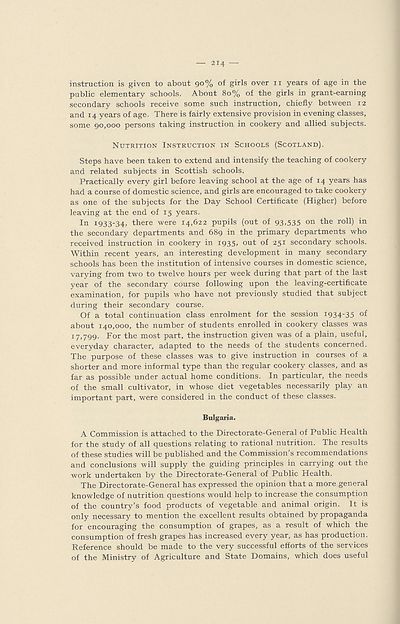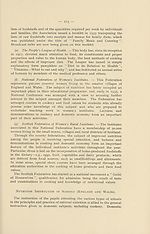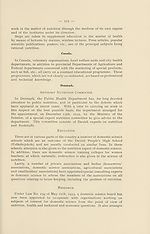Download files
Complete book:
Individual page:
Thumbnail gallery: Grid view | List view

2I4 —
instruction is given to about 90% of girls over n years of age in the
public elementary schools. About 80% of the girls in grant-earning
secondary schools receive some such instruction, chiefly between 12
and 14 years of age. There is fairly extensive provision in evening classes,
some 90,000 persons taking instruction in cookery and allied subjects.
Nutrition Instruction in Schools (Scotland).
Steps have been taken to extend and intensify the teaching of cookery
and related subjects in Scottish schools.
Practically every girl before leaving school at the age of 14 years has
had a course of domestic science, and girls are encouraged to take cookery
as one of the subjects for the Day School Certificate (Higher) before
leaving at the end of 15 years.
In 1933-34, there were 14,622 pupils (out of 93>535 on 'the roll) in
the secondary departments and 689 in the primary departments who
received instruction in cookery in I935> out of 251 secondary schools.
Within recent years, an interesting development in many secondary
schools has been the institution of intensive courses in domestic science,
varying from two to twelve hours per week during that part of the last
year of the secondary course following upon the leaving-certificate
examination, for pupils who have not previously studied that subject
during their secondary course.
Of a total continuation class enrolment for the session 1934-35 of
about 140,000, the number of students enrolled in cookery classes was
17,799. For the most part, the instruction given was of a plain, useful,
everyday character, adapted to the needs of the students concerned.
The purpose of these classes was to give instruction in courses of a
shorter and more informal type than the regular cookery classes, and as
far as possible under actual home conditions. In particular, the needs
of the small cultivator, in whose diet vegetables necessarily play an
important part, were considered in the conduct of these classes.
Bulgaria.
A Commission is attached to the Directorate-General of Public Health
for the study of all questions relating to rational nutrition. The results
of these studies will be published and the Commission’s recommendations
and conclusions will supply the guiding principles in carrying out the
work undertaken by the Directorate-General of Public Health.
The Directorate-General has expressed the opinion that a more general
knowledge of nutrition questions would help to increase the consumption
of the country’s food products of vegetable and animal origin. It is
only necessary to mention the excellent results obtained by propaganda
for encouraging the consumption of grapes, as a result of which the
consumption of fresh grapes has increased every year, as has production.
Reference should be made to the very successful efforts of the services
of the Ministry of Agriculture and State Domains, which does useful
instruction is given to about 90% of girls over n years of age in the
public elementary schools. About 80% of the girls in grant-earning
secondary schools receive some such instruction, chiefly between 12
and 14 years of age. There is fairly extensive provision in evening classes,
some 90,000 persons taking instruction in cookery and allied subjects.
Nutrition Instruction in Schools (Scotland).
Steps have been taken to extend and intensify the teaching of cookery
and related subjects in Scottish schools.
Practically every girl before leaving school at the age of 14 years has
had a course of domestic science, and girls are encouraged to take cookery
as one of the subjects for the Day School Certificate (Higher) before
leaving at the end of 15 years.
In 1933-34, there were 14,622 pupils (out of 93>535 on 'the roll) in
the secondary departments and 689 in the primary departments who
received instruction in cookery in I935> out of 251 secondary schools.
Within recent years, an interesting development in many secondary
schools has been the institution of intensive courses in domestic science,
varying from two to twelve hours per week during that part of the last
year of the secondary course following upon the leaving-certificate
examination, for pupils who have not previously studied that subject
during their secondary course.
Of a total continuation class enrolment for the session 1934-35 of
about 140,000, the number of students enrolled in cookery classes was
17,799. For the most part, the instruction given was of a plain, useful,
everyday character, adapted to the needs of the students concerned.
The purpose of these classes was to give instruction in courses of a
shorter and more informal type than the regular cookery classes, and as
far as possible under actual home conditions. In particular, the needs
of the small cultivator, in whose diet vegetables necessarily play an
important part, were considered in the conduct of these classes.
Bulgaria.
A Commission is attached to the Directorate-General of Public Health
for the study of all questions relating to rational nutrition. The results
of these studies will be published and the Commission’s recommendations
and conclusions will supply the guiding principles in carrying out the
work undertaken by the Directorate-General of Public Health.
The Directorate-General has expressed the opinion that a more general
knowledge of nutrition questions would help to increase the consumption
of the country’s food products of vegetable and animal origin. It is
only necessary to mention the excellent results obtained by propaganda
for encouraging the consumption of grapes, as a result of which the
consumption of fresh grapes has increased every year, as has production.
Reference should be made to the very successful efforts of the services
of the Ministry of Agriculture and State Domains, which does useful
Set display mode to:
![]() Universal Viewer |
Universal Viewer | ![]() Mirador |
Large image | Transcription
Mirador |
Large image | Transcription
Images and transcriptions on this page, including medium image downloads, may be used under the Creative Commons Attribution 4.0 International Licence unless otherwise stated. ![]()
| League of Nations > Economic and financial section > Problem of nutrition > (216) |
|---|
| Permanent URL | https://digital.nls.uk/190926570 |
|---|
| Shelfmark | LN.II |
|---|
| Description | Over 1,200 documents from the non-political organs of the League of Nations that dealt with health, disarmament, economic and financial matters for the duration of the League (1919-1945). Also online are statistical bulletins, essential facts, and an overview of the League by the first Secretary General, Sir Eric Drummond. These items are part of the Official Publications collection at the National Library of Scotland. |
|---|---|
| Additional NLS resources: |
|

